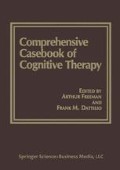Abstract
A 30-year history of cognitive therapy theory followed by a significant body of treatment research has given the practitioner credible and effective paths to conceptualize and remedy mood disorders (Beck, 1961, 1963, 1967; Beck, Rush, Shaw, & Emery, 1979; Ellis, 1962). This may be especially true for the client who is dealing with emotional problems associated with adjusting to demanding changes in life. The cognitive model promotes a collaboration with patients in defining problems in their own terms and using common sense to change thinking and to manage those problems (Beck, 1976; Beck et al., 1979). The therapist’s role in this model of treatment is to work with clients’ conscious ideas and to enhance or modify thought patterns and coping techniques to restore or improve functioning.
“We cannot think first and act afterwards. From the moment of birth we are immersed in action, and can only fitfully guide it by taking thought.” —Alfred North Whitehead
Access this chapter
Tax calculation will be finalised at checkout
Purchases are for personal use only
Preview
Unable to display preview. Download preview PDF.
References
American Psychiatric Association. (1987). Diagnostic and statistical manual of mental disorders (rev. 3rd ed.). Washington, DC: Author.
Beck, A. T. (1961). A systematic investigation of depression. Comprehensive Psychiatry, 2, 162–170.
Beck, A. T. (1963). Thinking and depression. Archives of General Psychiatry, 9, 324–333.
Beck, A. T. (1967). Depression: clinical, experimental, and theoretical aspects. New York: Harper and Row.
Beck, A. T. (1976). Cognitive therapy and the emotional disorders. New York: New American Library.
Beck, A. T., Rush, A. J., Shaw, B. F., & Emery, G. (1979). Cognitive therapy of depression. New York: Guilford.
Ellis, A. (1962). Reason and emotion in psychotherapy. New York: Lyle Stuart.
Ellis, A. (1970). The essence of rational psychotherapy: A comprehensive approach to treatment. New York: Institute for Rational Living.
Ellis, A., & Dryden, W. (1987). The practice of rational-emotive therapy. New York: Springer.
Freeman, A., & DeWolf, R. (1989). Woulda, coulda, shoulda. New York: William Morrow.
Garner, A. (1981). Conversationally speaking. New York: McGraw-Hill.
Meichenbaum, D. H. (1977). Cognitive-behavior modification: An integrative approach. New York: Plenum.
Peck, M. S. (1978). The road less traveled. New York: Simon & Schuster.
Suggested Readings
Peck, M. S. (1978). The road less traveled. New York: Simon & Schuster.
Clance, P. R. (1985). The imposter phenomenon. Atlanta: Peachtree.
Beck, A. T., Rush, A. J., Shaw, B. F., & Emery, G. (1979). Cognitive therapy of depression. New York: Guilford.
Frankl, V. F. (1978). The unheard cry for meaning. New York: Simon & Schuster.
Freeman, A., Simon, K. M., Beutler, L. F., & Arkowitz, H. (Eds.). (1989). Comprehensive handbook of cognitive therapy. New York: Plenum.
Author information
Authors and Affiliations
Editor information
Editors and Affiliations
Rights and permissions
Copyright information
© 1992 Springer Science+Business Media New York
About this chapter
Cite this chapter
Gilson, M. (1992). An Adjustment Disorder. In: Freeman, A., Dattilio, F.M. (eds) Comprehensive Casebook of Cognitive Therapy. Springer, Boston, MA. https://doi.org/10.1007/978-1-4757-9777-0_10
Download citation
DOI: https://doi.org/10.1007/978-1-4757-9777-0_10
Publisher Name: Springer, Boston, MA
Print ISBN: 978-0-306-44070-0
Online ISBN: 978-1-4757-9777-0
eBook Packages: Springer Book Archive

